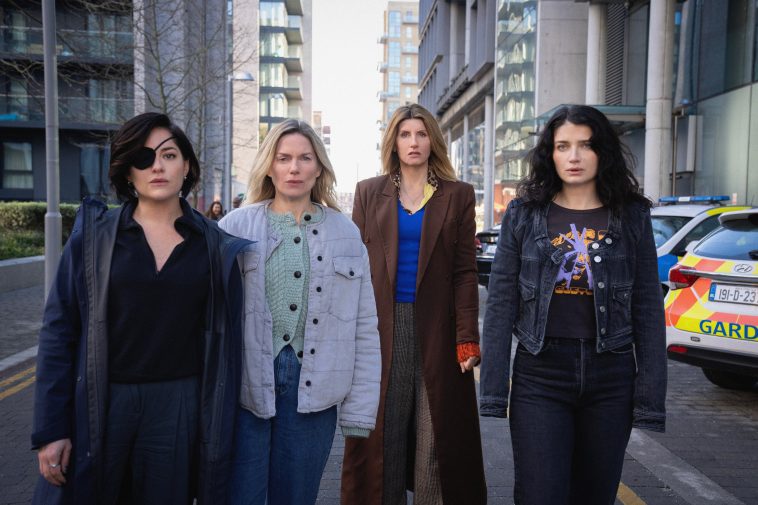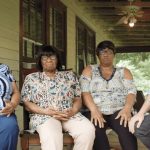Spoilers for the season two finale of Bad Sisters ahead.
“How do we say goodbye?” Eve Hewson’s Becka asks her fellow Bad Sisters as they set the ashes of their deceased sister Grace (Anne-Marie Duff) off to sea in the show’s season two finale. It’s a question series creator and star Sharon Horgan also grappled with when bidding farewell to her (Stanley Tucci–approved!) dark comedy about disjointed Irish sisters who band together against a pair of total pricks.
That seaside send-off still lingers for Horgan, partly because she lost her own father midway through production. “So I had this well of tears, and all those girls were so incredible to me when I was going through it,” she tells Vanity Fair. “It was just captured in that moment, wanting to be there for each other and wanting to say goodbye in the best possible way.”
“I find it emotional talking about it sometimes, it’s so weird,” Horgan says from the bustling café she’s tucked into to discuss the Bad Sisters finale, titled “Cliff Hanger.” As the title would suggest, tensions for the Garvey sisters—Horgan’s Eva and Hewson’s Becka bookend middle siblings Ursula (Eva Birthistle) and Bibi (Sarah Greene)—culminate on a literal cliffside. That’s where they attempt to dispose of what they believe to be the dead body of their late sister’s Dirty John–esque con man husband, Ian (actually a married cop named Cormac), played by Owen McDonnell.
Across two seasons on Apple TV+, Bad Sisters offered a catharsis that felt specific to current real-world anxieties. “Women watch it and feel that it’s a story for now. You always want to make something that exists for a reason,” says Horgan. That was also true for the finale, in which Ian miraculously lives.
If the episode reminds audiences of the recent resurrection of another shady man who has wreaked havoc on women’s lives, Horgan gets it. “I suppose that we all hoped we’d be in a different place in the world right now. It’s a horrible history repeating itself,” she says. “But there’s some sort of comfort watching something that gives you that feeling of what love or family can do when you’re united and behind each other. Good versus evil. It’s a story that’s been told a thousand times, but I just felt delighted that people got into it.”
Vanity Fair: You took some big swings this season. Was there one that you were most nervous about?
Sharon Horgan: I was really anxious about how people would respond to the Eva and Ian storyline.
Owen McDonnell as Ian and Sharon Horgan as Eva in Bad Sisters season 2.Copyrighted
Before we learn that Ian has been living this double life, he and Eva do seem to have genuine chemistry. How much do you attribute their brief romance to Eva’s grief over the loss of Grace?
I don’t think she would even have considered it for a second, but I’ve been through that situation—how much you’re trying to take the hurt away, how clouded your judgment is, and just how much pain you’re in. You’re looking for something to just make you feel human again or to feel love—anything that sort of helps. I mean, the great thing is that the chemistry is there. So, in a weird way, you invest in it. Because you’ve seen Eva go through so much heartache with the prick, and the fact that her life hasn’t ended up in any way like she thought it might. You’ve seen her try and fail in love. So maybe on some weird level, you are almost rooting for it.
And he just seems like such a great person. I mean, there’s always little hints—how he intimidates Angelica [played by Fiona Shaw]. But then you’re also on his team because she’s a wagon. [Editor’s note: That’s Irish slang for an unruly woman.] I was worried, because I showed my 20-year-old daughter some unfinished edits along the way and I remember her just being so angry with me—like, What the hell?
When Ian is introduced, you want him to be a good guy so badly because of everything Grace has endured. But it does feel like given her vulnerable state after the events of season one, it’s more likely that she would be taken advantage of by a new man in her life.
Completely. I read a lot about psychopaths, narcissists, men who specifically target women like Grace. He found her at a bereavement group, which is what they do. They look for women who are in really difficult situations and bad relationships. And I think for me, an issue was, well, Eva is such a strong woman. She’s been through it all, she’s also clued in—how would someone like her fall for it? But she’s the vulnerable woman when he comes to her. She’s suffering. She’s lost her sister, one of the loves of her life. So it can happen to anyone, unfortunately.
Did you worry that between Angelica coming back from the brink of death and numerous failed attempts to kill Ian, there were too many death fake-outs this season?
You know what? I think there were probably several drafts where he did die. And there were probably drafts where Angelica died. But I felt very protective of the sisters, and of the situation as well. I wanted Una [a junior detective played by Thaddea Graham] to come through as a real heroine in the end. I was mindful of what she could and couldn’t do [legally]. You know what I mean? So part of it is my black humor of putting them in this situation where they think they’re disposing of a body, and then that body not being a body after all. [Laughs] Because of the humor of the show, I thought it was something you could play with.
They still have to make a decision. It’s not something that’s thrust on them. If it was Angelica’s deed, then I wanted it to be their choice not to [kill him]. They’re not murderers and I was thinking, what would real women do in that situation? And there’s a difference between plotting the death of your abusive brother-in-law and letting someone die on the edge of a cliff.
Eva Birthistle as Ursula, Sharon Horgan as Eva, Sarah Greene as Bibi, and Eve Hewson as Becka in Bad Sisters season 2.Natalie Seery
It’s Becka who reminds the sisters that they’re not murderers and urges them to call the authorities. Why was she the right person to bring them back to earth?
Because she’s pregnant. It’s not just themselves they’re looking after. It’s Blanaid [Saise Quinn] and Becka’s baby. So, it felt really right that it was Becka who’s the voice of reason in the end, because she was so gung-ho in that first season. She was like, “Fuck it. Let’s just lock him in the freezer.” I think I wanted to give them all a position on the cliff of what you’d expect that character to do, then confound that expectation.
There’s a moment in the finale where Grace’s daughter Blánaid shares her perspective on all of the family secrets that are being kept from her. How will all of this impact her future?
What was really important to me was to bring her and Eva back together, because I have teenage daughters, and the greatest thing is when they don’t entirely close up on you. It’s so difficult to express what you’re really feeling when you’re that age. In the first season, Eva was her substitute mum in some way, like her favorite aunt. Then of course, when you go through something as difficult as losing a parent, you need to hit out at the person you think is not going to go away. And Eva gets the brunt of it.
Obviously the worst thing that could have happened has happened to her, but she’s surrounded by family—these women who love her and would do anything for her. And she’s got the memory of this incredible woman who she was everything to. There’s a sense that she’s going to be okay. The Garveys as young sisters were without parents, they had each other, and they got by. I wanted that to be the feeling that people are left with—that love.
This season, you explore institutional sexism and bigotry through the characters of Una and Ian. Where do you see them headed?
Oh, Ian can just go to hell. [Laughs] I never want to think about him again.
With Una and the police institution, I wanted to introduce a character who was just plain good, and would always do the right thing. This particular career meant everything to her. Starts off very much involved with Loftus [played by Barry Ward]—how he investigates, but soon realizes that there’s something really rotten there. Is she willing to turn a blind eye to the old guard for her career, or is she going to forsake it?
Thaddea Graham as Una and Barry Ward as Fergus in Bad Sisters season 2.
When we were writing the first season, there was a lot going on in the world that just made me really, really unhappy, and anxious for my daughters. Some of it was what was happening within our government, but also what was happening within the police force. I heard Saoirse Ronan mentioning it on a talk show recently, but what played out with the tragic death of Sarah Everard, that was carried out by a police officer and someone you thought you should be able to trust. It really stayed with me. I knew that if I got to do [the show] again, I wanted to explore how on earth you can feel safe when the people who are supposed to be protecting you are the ones you have to be worried about the most.
But I also wanted to show that there’s hope when new blood like Una enters those institutions. You’re battling against all sorts of bigotry and people like [Detective Superintendent] Howlett [played by Lorcan Craitch], who would barely consider her if it wasn’t for the fact that they have quotas to fill. Sometimes you can get so down about the state of things, and then there’s these little shards of light. It’s an uphill battle, and sometimes you have to sacrifice things along the way. But Una is going to, in my eyes, just help change the world.
At the show’s New York premiere, you acknowledged the “wish fulfillment” element of “watching five women refuse to have their fates decided by the bad choices of bad men.” An evil man who defies logic and refuses to leave, despite the fact that he should be long gone, resonated differently postelection.
My God, it’s exactly it, isn’t it? It’s fucking exactly it. Just unkillable. Both of them. It’s a bit of a mirror. The prick was unkillable in season one until the right person got him. Ian, the same deal. I want him to go to hell, but I guess people like him find a way to continue to perpetrate. But what are you going to fucking do except stick together and be brave and stand up and be heard? All of these women inspire me, from Angelica to Una, to all the Garveys. They refuse to have their lights snuffed out. But it doesn’t stop it being really, really hard and exhausting.
The ending has a real sense of finality to it. Have you ruled out the possibility of a third season?
If I’m really, really honest, that is the ending that I wanted. If something comes into my head…I mean I just can’t imagine it. I got to say goodbye in a harder, more painful way. But that felt unfortunately closer to the reality of how those terrible abusive relationships can play out. It’s hard, but life goes on.
This interview has been edited and condensed for clarity.
The Twisted Love Story of a 95-Year-Old Diamond Heiress and a Much Younger Genderfluid Reality Star
Bobby Berk Explains Why He’s Really Leaving Queer Eye
Karen Read Tells Her Story: A Murder Trial in Massachusetts
The High Price of Being New York Society’s It Girl





GIPHY App Key not set. Please check settings